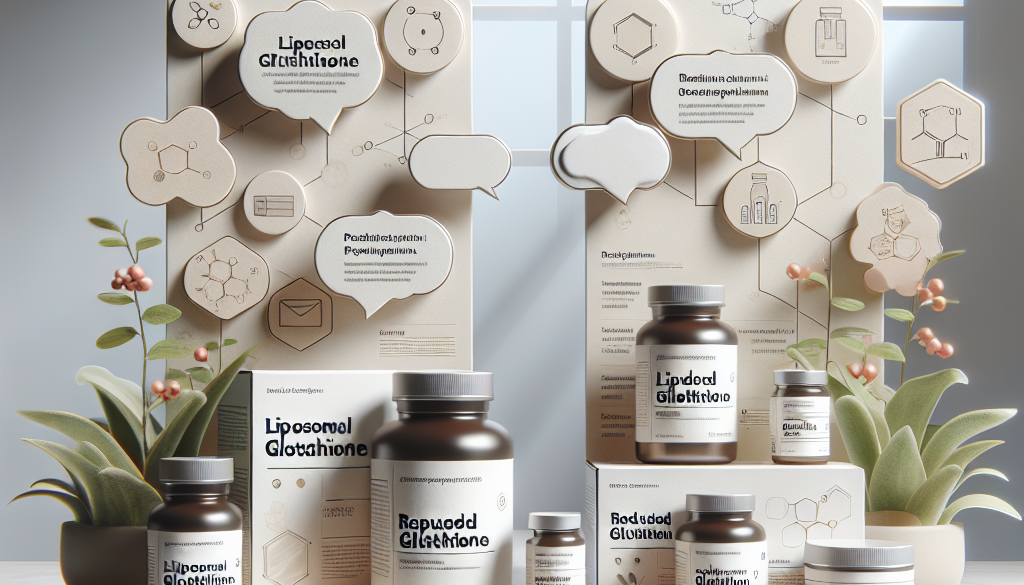Liposomal Glutathione vs Reduced: What’s the Best Option?
-
Table of Contents
- Liposomal Glutathione vs Reduced Glutathione: What’s the Best Option?
- Understanding Glutathione
- What is Reduced Glutathione?
- What is Liposomal Glutathione?
- Comparing Liposomal Glutathione and Reduced Glutathione
- 1. Absorption and Bioavailability
- 2. Efficacy in the Body
- 3. Cost and Accessibility
- 4. Clinical Support and Research
- Which Should You Choose?
- Conclusion
- Explore ETprotein’s Protein Products
Liposomal Glutathione vs Reduced Glutathione: What’s the Best Option?
Glutathione, often referred to as the “master antioxidant,” plays a crucial role in maintaining oxidative balance and overall health. Its benefits range from detoxification to enhancing immune function and potentially slowing the aging process. However, the method of glutathione supplementation can significantly affect its efficacy. This article delves into the differences between liposomal glutathione and reduced glutathione, helping you decide which form might be best suited for your health needs.
Understanding Glutathione
Before comparing the different forms of glutathione, it’s essential to understand what glutathione is and why it’s important. Glutathione is a tripeptide, consisting of three amino acids: cysteine, glutamate, and glycine. It is found in every cell of the body and is essential for cellular detoxification and the antioxidant defense system.
What is Reduced Glutathione?
Reduced glutathione, also known as GSH, is the active form of glutathione in the body. It is capable of donating electrons to stabilize free radicals, thereby neutralizing them. Reduced glutathione is critical for maintaining the oxidative balance within cells. However, when taken as a supplement, GSH faces challenges in terms of bioavailability and stability because it is prone to oxidation in the digestive tract.
What is Liposomal Glutathione?
Liposomal glutathione is a form of glutathione that is encapsulated within liposomes. Liposomes are tiny spherical vesicles that have a phospholipid bilayer, similar to the cell membranes in the human body. This encapsulation helps to protect glutathione from the harsh environment of the gastrointestinal tract, potentially enhancing its absorption and bioavailability.
Comparing Liposomal Glutathione and Reduced Glutathione
1. Absorption and Bioavailability
- Liposomal Glutathione: The liposomal encapsulation shields glutathione from enzymatic degradation in the digestive system, which may lead to higher absorption rates and better bioavailability.
- Reduced Glutathione: While effective in its active form, GSH is not absorbed efficiently when taken orally without protection due to its susceptibility to digestive enzymes.
2. Efficacy in the Body
- Liposomal Glutathione: Due to its enhanced absorption, liposomal glutathione can more effectively raise glutathione levels in the body, potentially offering more pronounced health benefits.
- Reduced Glutathione: Although it is the active form, the poor bioavailability when taken orally can limit its effectiveness in boosting cellular glutathione levels.
3. Cost and Accessibility
- Liposomal Glutathione: The technology involved in creating liposomal formulations makes this form of glutathione generally more expensive than its non-encapsulated counterparts.
- Reduced Glutathione: Typically less expensive and more widely available in various supplement forms.
4. Clinical Support and Research
- Liposomal Glutathione: Emerging research supports the enhanced efficacy of liposomal glutathione due to its superior absorption characteristics.
- Reduced Glutathione: There is extensive research on the benefits of reduced glutathione, though studies often highlight the challenges related to its stability and absorption.
Which Should You Choose?
The choice between liposomal glutathione and reduced glutathione largely depends on your specific health needs, budget, and preferences regarding supplement form. If you are looking for maximum absorption and efficacy, liposomal glutathione might be the better option, despite its higher cost. However, if budget is a concern and you are looking for a more traditional supplement form, reduced glutathione could still provide significant health benefits, especially if used under medical guidance.
Conclusion
In conclusion, both liposomal and reduced glutathione have their merits and can be effective in increasing the body’s antioxidant defenses. Liposomal glutathione stands out for its enhanced bioavailability and potential for greater efficacy, while reduced glutathione offers a more cost-effective solution with substantial benefits. Ultimately, the choice depends on individual needs and circumstances.
Explore ETprotein’s Protein Products
If you are interested in enhancing your health regimen, consider exploring ETprotein’s range of high-quality protein products. Their extensive selection includes organic and allergen-free options, perfect for boosting your nutritional intake and supporting overall health.
ETprotein is Liposomal reduced glutathione Factory Manufacturer and Supplier in China, Check further information by visiting the Liposomal reduced glutathione Product Page
Liposomal reduced glutathione Product Page
Request Quotation and Samples of Liposomal reduced glutathione from ETprotein
About ETprotein
ETprotein, a reputable protein and elite nutrition ingredients Liposomal reduced glutathione Chinese factory manufacturer and supplier, is renowned for producing, stocking, exporting, and delivering the highest quality organic bulk vegan proteins and elite nutritional ingredients Liposomal reduced glutathione. They include Organic rice protein, clear rice protein, pea protein, clear pea protein, watermelon seed protein, pumpkin seed protein, sunflower seed protein, mung bean protein, peanut protein. Their offerings, characterized by a neutral taste, non-GMO, allergen-free attributes, cater to a diverse range of industries. They serve nutraceutical, pharmaceutical, cosmeceutical, veterinary, as well as food and beverage finished product distributors, traders, and manufacturers across Europe, USA, Canada, Australia, Thailand, Japan, Korea, Brazil, and Chile, among others.
ETprotein specialization includes exporting and delivering tailor-made protein powder and finished nutritional supplements. Their extensive product range covers sectors like Food and Beverage, Sports Nutrition, Weight Management, Dietary Supplements, Health and Wellness Products, and Infant Formula, ensuring comprehensive solutions to meet all your protein needs.
As a trusted company by leading global food and beverage brands and Fortune 500 companies, ETprotein reinforces China’s reputation in the global arena. For more information or to sample their products, please contact them and email sales(at)ETprotein.com today.












